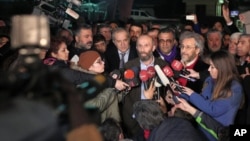Two prominent Turkish journalists have been freed from pre-trial detention following the intervention of the Constitutional Court. The journalists, who still face trial and up to 30 years in jail on charges of revealing state secrets, have become the focal point of global concerns over press freedom in Turkey.
In the early hours of Friday morning, journalists Can Dundar and Erdem Gul were released from a high-security prison in Istanbul after being held for 92 days, many of which were in solitary confinement.
Dundar expressed hope the Constitutional Court’s ruling would open the way for more freedom, saying the ruling opened the way, not just for them, but for all their colleagues in terms of press freedoms and freedom of expression.
Both men, from the newspaper Cumhuriyet, were detained in November over a report alleging that the government tried to ship arms to Islamists in Syria.
The Constitutional Court ruled the prosecutions violated the journalists’ individual freedom and media freedom.
Political scientist Cengiz Aktar of Istanbul’s Suleyman Sah University says the ruling is welcome but may remain only symbolic.
"Those who are for freedom of speech in this country are rejoicing; but, more than 30 journalists are in jail as of today," he said. "And we’ve just learned an independent TV channel has been just banned."
Turkish President Recep Tayyip Erdogan has personally intervened, repeatedly calling for their prosecution and pledging that Dundar would be severely punished.
Political scientist Aktar says the threat to the judiciary remains.
"Some interpret the decision of the Constitutional Court as the blow to the will of the president. We may think so, but I don't think people should declare victory," he said. "His [the president’s] office has declared that the prosecution and their case continue, which is a sheer interference in the functioning of the judiciary."
Despite their release, the two still face possible life sentences in convicted in a trial on espionage and terrorism charges starting on March 25.
Erdogan’s spokesman, Ibrahim Kalin, said the president was closely following the case, arguing it was in compliance with international norms. He said officials want to underscore that cases of espionage and leaks of information have been held in other parts of the world too.
The journalists' release has been welcomed by the European Union and international human rights groups.
Dundar has been strongly critical of the EU, accusing it of being muted in its criticism of his prosecution because it was seeking a deal with Ankara over stemming the flow of refugees into Europe.
The EU recently unfroze Ankara’s membership bid, despite Turkey slipping to 149 out of 180 countries on Reporters Without Borders’ World Press Freedom Index.




